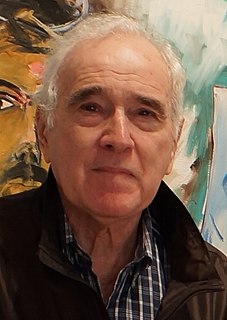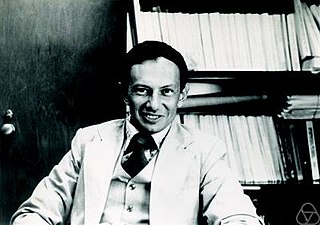Sources
- Kavanaugh, John F. (1991). "Lived Humanism: The Aesthetic Education of Albert William Levi". Journal of Aesthetic Education. 25 (4): 21–30. doi:10.2307/3332899. JSTOR 3332899.
Albert William Levi (June 19, 1911 –October 31, 1988) was an American philosopher.
Albert William Levi was born on June 19, 1911, in Indianapolis, Indiana. [1] He received an AB in sociology from Dartmouth College in 1932 and an AM (1933) and PhD (1935) from the University of Chicago. [1] [2] His AM and PhD theses were on Plato and John Stuart Mill, respectively. [2]
Levi taught at Dartmouth, Chicago, Black Mountain College, and briefly at two universities in Austria, before becoming a faculty member at Washington University in St. Louis, [1] where he was named the David May Distinguished University Professor of the Humanities in 1965. [3] [4] After his retirement from Washington University in 1979, he became the Andrew W. Mellon Professor of the Humanities at Tulane University. [4]
Levi published over 70 articles and 10 books. [2] His research interests included philosophy of culture, the history of modern philosophy, social philosophy, metaphysics, and aesthetics. [5] He received the Ralph Waldo Emerson Award for his book Philosophy and the Modern World (1959). [3] In 1966, President Lyndon B. Johnson appointed Levi to the National Council on the Humanities, the governing body of the National Endowment for the Humanities. [4]
He died on October 31, 1988, [5] in University City, Missouri. [4]

Kwame Akroma-Ampim Kusi Anthony Appiah is a British-Ghanaian philosopher, cultural theorist, and novelist whose interests include political and moral theory, the philosophy of language and mind, and African intellectual history. Appiah was the Laurance S. Rockefeller University Professor of Philosophy at Princeton University, before moving to New York University (NYU) in 2014. He holds an appointment at the NYU Department of Philosophy and NYU's School of Law.
Henry Babcock Veatch Jr. was an American philosopher.

Donald Kuspit is an American art critic and a poet, known for his practice of psychoanalytic art criticism. He has published on the subjects of Avant-garde aesthetics, Postmodernism, Modern art, and Conceptual art.

Morris Weitz "was an American philosopher of aesthetics who focused primarily on ontology, interpretation, and literary criticism". From 1972 until his death he was Richard Koret Professor of Philosophy at Brandels University.
Peter J. Caws was a British American philosopher and administrator, and University Professor of Philosophy and Professor of Human Sciences at the George Washington University.
Michael Friedman is an American philosopher who serves as Professor of Philosophy and the Frederick P. Rehmus Family Professor of Humanities at Stanford University. Friedman is best known for his work in the philosophy of science, especially on scientific explanation and the philosophy of physics, and for his historical work on Immanuel Kant. Friedman has also done historical work on figures in continental philosophy such as Martin Heidegger and Ernst Cassirer. Friedman also serves as the co-director of the Program in History and Philosophy of Science and Technology at Stanford University.
John King Roth is an American-based author, editor, and the Edward J. Sexton Professor Emeritus of Philosophy at Claremont McKenna College (CMC) in Claremont, California. Roth taught at CMC from 1966 through 2006, where he was the founding director of the Center for the Study of the Holocaust, Genocide, and Human Rights, which is now the Mgrublian Center for Human Rights. Best known for his contributions to Holocaust and genocide studies, he is the author or editor of more than fifty books. In 1988, he was named the U.S. National Professor of the Year by the Council for Advancement and Support Education and the Carnegie Foundation for the Advancement of Teaching.
Robert John Fogelin was an American philosopher. He was a professor of philosophy and Sherman Fairchild Professor in the humanities (emeritus) at Dartmouth College where he had taught since 1980. He was elected a fellow of the American Academy of Arts and Sciences in 2005.
Steven D. Walt is a law professor at the University of Virginia School of Law. He teaches courses on contracts, sales/commercial paper, legal philosophy, bankruptcy and secured transactions.
Eleonore Stump is the Robert J. Henle Professor of Philosophy at Saint Louis University, where she has taught since 1992.

Edward S. Casey is an American philosopher and university professor. He has published several volumes on phenomenology, philosophical psychology, and the philosophy of space and place. His work is widely cited in contemporary continental philosophy. He is currently Distinguished Professor of Philosophy at Stony Brook University in New York and distinguished visiting faculty at Pacifica Graduate Institute.

Kenneth Irwin Gross was an American mathematician.
Julia Driver is professor of philosophy at University of Texas at Austin, starting in fall 2019. Beginning in fall 2020, she also will be the Darrell K. Royal Chair in Ethics and American Society. Prior to that, she was a professor of philosophy at Washington University in St. Louis. At the same Driver and fellow WUSTL philosopher Roy Sorenson were both hired by UT Austin, they were also named professorial fellows at University of St Andrews. She is the author of Uneasy Virtue, Consequentialism, and Ethics: The Fundamentals, as well as many articles in ethics and moral psychology. She is the leading proponent of a consequentialist approach to virtue theory. Before coming to Washington University, she taught at Dartmouth College, Virginia Tech, and Brooklyn College CUNY. She received her PhD from Johns Hopkins University in 1990, and her BA from the University of Texas at Austin in 1983.
Herbert Charles Sanborn was an American philosopher, academic and one-time political candidate. He received his PhD from the University of Munich in Germany and briefly taught at Washington College. He was the Chair of the Department of Philosophy and Psychology at Vanderbilt University in Nashville, Tennessee from 1921 to 1942, and he served as the president of the Nashville German-American Society. In his retirement, he continued to coach the Vanderbilt Fencing Team. He ran for the Tennessee State Senate unsuccessfully in 1955. He was opposed to the Civil Rights Movement, and he published antisemitic pamphlets.
Roger Fletcher Gibson Jr. was an American philosopher specializing in epistemology and the philosophy of language. He was best known as a leading exponent of the philosophy of W. V. Quine.
K. Danner Clouser was an American bioethicist.